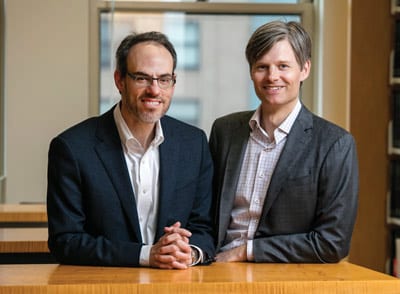
Partners in Leadership co-chairs Tyler Gerking ’02 (partner at Farella Braun + Martel) and David Zapolsky ’88 (general counsel of Amazon.com) describe the broad benefits of this annual campaign.
How does Partners in Leadership (PiL) work?
TG: It’s a fundraising drive that builds camaraderie among alumni, strengthens connections to Berkeley Law, and supports students. The goal is to get organizations with one or more of our graduates—firms, in-house legal departments, government agencies, non-profits—to rally all of their alumni co-workers to donate to the law school.
DZ: A broader goal is to build a culture of giving among alumni. It’s so important that all alumni, including our most recent grads, get in the habit of participating and giving back however they can.
TG: That’s right. Our alumni giving participation rate is low compared to other top schools, so we want to improve that. We encourage “meaningful” contributions—giving an amount that’s reasonable for each person. Obviously, partners are able to give more than new associates.
What does a PiL captain do?
TG: Each organization has at least one captain to encourage colleagues to give. Speaking from personal experience, it doesn’t take much effort. Often it’s just explaining to people the school’s situation: With declining state support and increasing financial pressures due to the legal market and competition among law schools, today’s students need alumni support more than ever.
DZ: My favorite part is talking to alumni about what’s going on at the school. There’s so much exciting stuff happening that alumni aren’t aware of. Once you give some examples, it’s eye-opening, and people enthusiastically get on board. Why should organizations with Berkeley Law alums take part in this campaign?
TG: My firm encourages its attorneys to participate in the community and support causes they believe in, like their alma maters. But PiL also engenders some cohesion within our firm. Because of PiL, I’ll talk to colleagues in different practice groups that I normally wouldn’t interact with much. It’s a good way to get to know your co-workers better.
DZ: It also benefits companies and firms, long-term, for their lawyers to engage with their law school communities in different ways. We rely on those institutions to produce high-quality, talented individuals to join our ranks. It’s in the interest of all of us to preserve and nurture institutions like Berkeley Law to attract and support the next generation of great lawyers.
How does PiL strengthen connections to the law school?
DZ: It’s easy to get disconnected from what’s happening on campus, especially if you’re outside of the Bay Area. Because Berkeley Law is a public institution, people assume we’ll always be here, because we always have been; but when you explain what’s going on financially, alums are surprised and want to help support the school that meant so much to them.
What’s the future of the PiL campaign?
TG: Our alumni association board recognizes this campaign’s value and the importance of powering it forward. We’ve added many new organizations, particularly inhouse legal departments, which is great because we’re expanding our alumni population’s diversity. As of midApril, we were already up 300 participants from last year. So PiL is growing significantly.
DZ: It’s easier for a colleague in the same institution, a fellow alum, to reach out and discuss the school’s needs than it is for someone in the dean’s office or the alumni relations office. This organizing principle has great communication potential, and if we can find a leader in every organization with multiple Berkeley Law graduates, the program could almost run itself. We’re only scratching the surface of what we can accomplish, and I have high hopes for continued momentum.
This year’s Partners in Leadership campaign ends June 30. Visit law.berkeley. edu/giving/partners-in-leadership or contact Holly Fincke at hfincke@law. berkeley.edu to learn how your organization can join PiL, or to make a gift.
